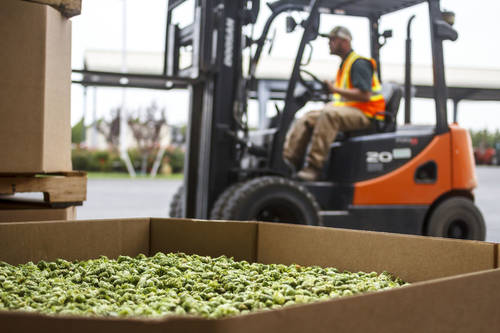

In response to the craft beer explosion, hundreds of millions of dollars have been spent in the Pacific Northwest on hops infrastructure in the past five years. Brewers and growers both desire environmental, human, economic, and social sustainability
on the farm, but it comes with substantial risk.
This risk can be illustrated with a comparison between growing an agricultural product such as corn to hops. If one were to walk into any grocery store, they could find products made with corn in virtually every aisle; corn on the cob, canned corn, toothpaste, any product that has high fructose corn syrup, chewing gum, fuel, milk from corn fed cows, diapers, and even shampoo. Hops however, are only found in the beer aisle. Corn has hundreds of uses, hops have one. Growing hops is extraordinarily expensive compared to other agricultural products. A brief search reveals that the cost of growing an acre of corn is estimated to be $385, an acre of soybeans or wheat $195; an acre of hops cost $7,500 to grow. These costs are compounded by the investment in adding new hop acreage. Investments required for land, machinery, and trellis is between $15,000 and $45,000 per acre, typically financed over
7-10 years. An average gross return of $13,000 to $14,000 per acre is an absolute requirement over a ten-year period for heavily invested farms to cover growing cost, profit, and debt servicing obligations. Responsible contracting at every level of the supply chain is more important than ever before.
Growers, dealers, and brewers need to work with transparency to balance supply with demand at reasonable prices, or there will be massive shifts in supply and pricing. Supply and demand alignment becomes a reality through responsible contracting, and open communication.
As a relatively extreme illustration, lack of communication can quickly lead to an oversupply of hops. If a brewer needs 10,000 pounds of hops, and the brewer, dealer, and grower each carry a 10% buffer above their needs, there will be over 30% excess hops planted than are needed. Given the craft beer explosion over the
last several years, excess supply is likely to be used up by another brewer’s growth, but that will not always be an option.
Looking back to the corn analogy, with no alternative uses for hops, any oversupply will sit in a warehouse, not in a brew kettle. There is no toothpaste or corn syrup to soak up the excess production. An oversupply of hops is problematic for growers, dealers, and brewers. This oversupply is what caused hop shortages historically; a glut in the market with no alternative use sits in a warehouse. Prices are likely to drop driving growers out of business. When supply levels drop, and there are fewer growers, there may not be enough acres in the ground to meet demand, and prices will rise.
Part of what makes the craft beer culture so great is the relationship between brewers and growers driving transparency and collaboration. Craft beer doesn’t care about norms and tradition, it cares about what is real, what is creative, what sustains, and what is right. The creativity that drives craft beer drives us to create a new normal, of quality, transparency, and sustainability. Just because history tells us that hops always cycle through boom and bust doesn’t mean that will happen.
We market our hops through YCH because of our shared commitment to long term sustainability for brewers and growers. We target how many pounds of a brand are needed, and jointly develop a plan for acreage expansion or reduction to align supply and demand. YCH manages a buffer to consistently get brewers their contracted volumes while not putting the grower at risk.
In the four years of working under this model, no brewer that had a contract with YCH for SIMCOE®, CITRA®, or Mosaic® has been shorted on their volumes. There have been some shortages in other SBG brands such as AHTANUM™ Brand YCR 1. This shortage has been driven by Hop Stunt viroid. In 2014 AHTANUM™ tested positive for Hop Stunt viroid, which dramatically impacted yield. In 2017, SBG is expanding AHTANUM™ acreage with Hop Stunt viroid free rootstock. The production from the expanded acreage will meet grower contracts this year and for years to come. This is the advantage of working with grower owned companies. YCH provides a unique opportunity for the brewing and hop growing communities; they connect brewers, breeders, and growers to create a cohesive, transparent supply chain. Taking full advantage of this opportunity to contract confidently and appropriately allows us to work together to create the long-term sustainability we all desire.
Posted April 05, 2017